The Supreme Court of New Jersey has agreed to consider Mary Richter v. Oakland Board of Education. The question before the court is whether the Appellate Division erred in finding that a diabetic teacher who suffered injuries after her blood sugar dropped on the job could pursue her disability discrimination claim against her employer without demonstrating that she suffered an adverse employment action.
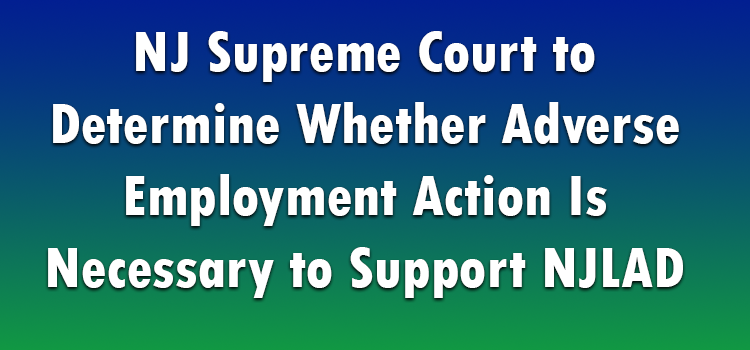
Facts of Richter v. Oakland Board of Education
Plaintiff Mary Richter, a middle school teacher who suffers from diabetes, alleged she fainted while teaching due to low blood sugar levels when she was unable to eat lunch at an earlier class period and suffered significant and permanent injuries. She further contended that the accident would not have occurred had the Oakland Board of Education (the Board) and her school’s principal, Gregg Desiderio, granted her accommodation request to eat lunch earlier.
According to Richter, she believed that waiting until seventh period, which began at 1:05 p.m., to eat a meal would have a negative effect on her blood sugar levels due to the medications she takes for her diabetes. Therefore, she asked to have her schedule adjusted so that she could have lunch during the earlier fifth period. While Richter’s request was ultimately granted for a few months, her schedule returned to the 1:05 lunch time for one day a week (Tuesday). On Tuesday, March 5, 2013, towards the end of the sixth period, despite ingesting glucose tablets throughout the period, Richter suffered a hypoglycemic event in front of her students. She had a seizure and became unconscious causing her to strike her head and face on a lab table and the floor, and to bleed extensively.
As a result of her work-related injuries, Richter filed a lawsuit against the Board and Desiderio, individually and as principal of the school, alleging disability discrimination in violation of the New Jersey Law Against Discrimination (NJLAD) due to their alleged failure to accommodate her medical condition. The motion judge dismissed the suit, finding that Richter failed to prove a prima facie case of failure to accommodate her disability because she did not establish an adverse employment action.
Appellate Division Decision in Richter v. Oakland Board of Education
The Appellate Division reversed. It held that an employee alleging disability discrimination for failure to accommodate under the NJLAD is not required to establish an adverse employment action to avoid summary judgment dismissal.
In reaching its decision, the Appellate Division relied heavily on the Supreme Court of New Jersey’s decisions in Victor v. State, 203 N.J. 383 (2008) and Royster v. N.J. State Police, 227 N.J. 482 (2017). In those cases, the state’s highest court recognized that the NJLAD might cover a disability discrimination claim for failure to accommodate absent an adverse employment action.
“Our interpretation of Victor and Royster leads us to conclude that Richter’s LAD claim for failure to accommodate her diabetes disability should not have been dismissed on summary judgment based on a lack of adverse employment action,” the appeals court wrote. “Viewing the facts in the light most favorable to Richter, her claim falls within the unusual situation contemplated in Victor where ‘the employee could demonstrate that the failure to accommodate forced the employee to soldier on without a reasonable accommodation[]’ and there need not be proof of adverse employment action because the circumstances ‘cry out for a remedy.’”
The court further explained:
She requested an accommodation for an earlier lunch period to avoid a hypoglycemic event from not eating, which was provided for one marking period but not the following marking period. Under the impression that Desiderio did not change her schedule to allow for the earlier lunch period and she could not eat her lunch while supervising students during her cafeteria duty, Richter “soldiered on” by taking glucose tablets to maintain her blood sugar levels in order to teach. Sadly, her worst fears came to fruition when she fainted and seriously injured herself in front of her students. Hence, she should be allowed to present her claim for damages under the LAD at trial.
Issues Before the New Jersey Supreme Court
The Supreme Court of New Jersey granted certification on November 4, 2019. The court has agreed to consider the following question: “Is an employee alleging discrimination for failure to accommodate a disability, pursuant to the New Jersey Law Against Discrimination, N.J.S.A. 10:5-1 to -49, required to show an adverse employment action; and is this employee’s claim barred by the exclusive remedy provision of the Workers’ Compensation Act, N.J.S.A. 34:15-1 to -146?”
Oral arguments have not yet been scheduled.
The Supreme Court of New Jersey recently agreed to consider Elmer Branch v. Cream-o-Land Dairy. The closely-watched employment case involves the good-faith defense under the New Jersey Wage and Hour Law (WHL).
Facts of Elmer Branch v. Cream-o-Land Dairy
On November 29, 2016, plaintiff Elmer Branch filed a putative class action complaint against Cream-O-Land Dairy (COL). The suit alleged that the class members worked approximately sixty to eighty hours per week without being paid one-and-one-half times their hourly rates for hours worked in excess of forty hours per week in violation of the WHL.
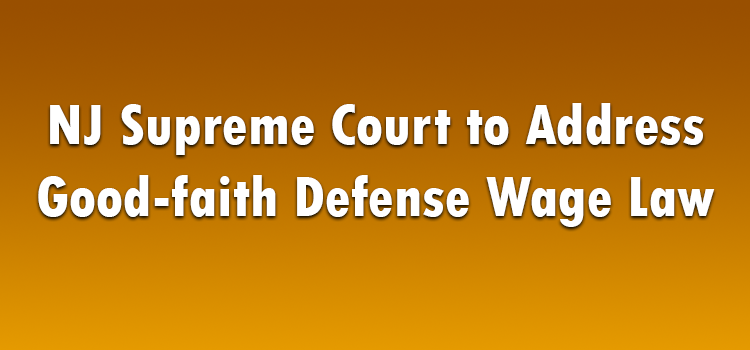
Defendant answered the complaint, denying the allegations and asserting, among other defenses, the WHL’s good-faith defense (N.J.S.A. 34:11-56a25.2). It provides:
In any action or proceeding commenced prior to or on or after the date of the enactment of this act based on any act or omission prior to or on or after the date of the enactment of this act, no employer shall be subject to any liability or punishment for or on account of the failure of the employer to pay minimum wages or overtime compensation under this act, if he pleads and proves that the act or omission complained of was in good faith in conformity with and in reliance on any written administrative regulation, order, ruling, approval or interpretation by the Commissioner of the [DOL] or the Director of the Wage and Hour Bureau, or any administrative practice or enforcement policy of such department or bureau with respect to the class of employers to which he belonged. Such a defense, if established, shall be a complete bar to the action or proceeding, notwithstanding, that after such act or omission, such administrative regulation, order, ruling, approval, interpretation, practice, or enforcement policy is modified or rescinded or is determined by judicial authority to be invalid or of no legal effect.
After the parties exchanged some written discovery, COL moved for summary judgment on the grounds that it was immunized from liability under the good-faith defense. In support, COL cited three determinations made by the New Jersey Department of Labor and Workforce Development (DOL) officials in response to complaints brought by individual COL employees. In the determinations, the DOL concluded that COL falls under the federal trucking guidelines regarding overtime exemptions, and thus the company was only required to pay drivers 1.5 times the state minimum wage for overtime wages, which its drivers were receiving. The trial agreed that COL was entitled to the good-faith defense and ordered summary judgment in its favor.
Appellate Division’s Decision in Elmer Branch v. Cream-o-Land Dairy
The Appellate Division reversed. “[W]e hold that such discrete determinations by DOL officials, which are subject to further administrative appeal, do not constitute an ‘administrative practice or enforcement policy’ and are insufficient to invoke the good-faith defense,” the court wrote.
The court first addressed whether the three initial determinations relied on by COL could serve as a basis for the good-faith defense. It concluded that in terms of the DOL’s enforcement investigations, only either the Commissioner’s final agency decision rendered after an OAL hearing or a Wage Collection Referee’s final decision qualifies as a “written administrative regulation, order, ruling, approval or interpretation by the Commissioner of the [Department of Labor and Workforce Development] or the Director of the Wage and Hour Bureau[.]” As the court explained:
We agree with plaintiff and Attorney General that the three initial determinations do not constitute an “administrative practice or enforcement policy” because they do not carry the imprimatur of the agency head. The three initial determinations addressed discrete complaints by individual employees based on information received from the employer. They were not espousing a general policy that applied broadly to a class of employers. Furthermore, the determinations by lower-level representatives of the DOL were subject to further administrative appeal and thus are not comparable to the final agency decisions that would suffice under the first portion of N.J.S.A. 34:11-56a25.2.
The Appellate Division went on to find that a 2006 opinion letter from the Director of the Division of Wage and Hour Compliance could qualify as an “administrative practice or enforcement policy” sufficient to support a good-faith defense. However, it nonetheless concluded that COL may not avail itself of the good-faith defense based on a 2006 opinion letter.
“[D]efendant presented no evidence in support of its motion for summary judgment that it relied on the 2006 opinion letter in determining the appropriate compensation for its employees,” the court explained. “Because defendant failed to establish such reliance, it may not avail itself of the good-faith defense based on the 2006 opinion letter.”
Issues Before the New Jersey Supreme Court
On December 5, 2019, the New Jersey Supreme Court granted certification. It has agreed to consider the following question: “In this class action alleging a failure to pay overtime wages in violation of the New Jersey Wage and Hour Law, is the good-faith defense, N.J.S.A. 34:11-56a25.2, available to defendant based on determinations made by employees of the New Jersey Department of Labor and Workforce Development?”
Oral arguments have not yet been scheduled.
The New Jersey Supreme Court recently granted certification in State v. Luis A. Maisonet. The case involves the extent of the right to counsel under the Sixth Amendment.
The Sixth Amendment, applicable to the states by virtue of the Fourteenth Amendment, ensures a defendant in a criminal prosecution shall enjoy the right to the assistance of counsel. The Sixth Amendment specifically requires the “assistance of counsel” for the accused “in all criminal prosecutions.”
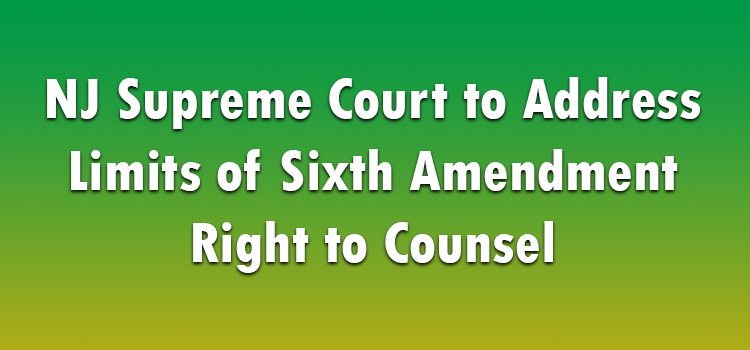
The New Jersey Constitution includes similar guarantees. It states: “In all criminal prosecutions the accused shall have the right to a speedy and public trial by an impartial jury; to be informed of the nature and cause of the accusation; to be confronted with the witnesses against him; to have compulsory process for obtaining witnesses in his favor; and to have the assistance of counsel in his defense.”
Facts of the Case
On September 1, 2016, Defendant Luis Maisonet’s (Defendant or Maisonet) former girlfriend, Jennifer Villanueva, and her live-in boyfriend, Christopher Romero, drove to Atlantic City, where they worked at a mall. In the middle of that day, the Defendant walked into a clothing store managed by Romero and shot him. After Romero fell to the ground, the Defendant shot him two more times.
According to eyewitness testimony, after the Defendant shot Romero, he left the scene, crossed the street and walked into another clothing store where Villanueva was working. He retrieved the gun from the bag again, pointed it at Villanueva, said “bye-bye, baby,” and then fired the gun into the store ceiling before shooting himself. An off-duty police officer was able to move the gun away from the Defendant once he had fallen to the floor and reached for the gun again.
Maisonet was charged withfirst-degree murder; second-degree possession of a firearm for an unlawful purpose; second-degree unlawful possession of a weapon without a permit; and fourth-degree aggravated assault. His trial started in December 2017, approximately 15 months after the murder. On the first day of trial, as jury selection was due to commence, the Defendant requested an adjournment to retain private counsel. He expressed the concern that his then-current attorney, a public defender, lacked experience as she had “only two murder–two trials in her practice.”
However, the Defendant also conceded he had told his attorney, “if she could get me a deal, I’d go with her all the way to the end.” The trial judge informed the Defendant he had two choices: either hire his own attorney or represent himself. Defendant asked for time to call his family members to see if they could “get some money together” to hire private counsel. He did not mention the name of any particular attorney nor state any prior efforts he had made to retain private counsel. After listening to the Defendant’s concerns, the trial court denied the adjournment request, finding his public defender to be experienced and capable of representing him. It also observed that the Defendant had known about the trial date for a long period of time and knew who his attorney was.
Appellate Division Decision
The Appellate Division affirmed the Defendant’s conviction and sentence. In doing so, it rejected the Defendant’s argument that he was deprived of his constitutional right to counsel when the trial judge denied his request for a continuance to retain private counsel.
In reaching its decision, the court explained that the right to retain counsel of one’s own choice is not absolute. It “cannot be insisted upon in a manner that will obstruct an orderly procedure in courts of justice and deprive such courts of the exercise of their inherent powers to control the same.” State v. Furguson, 198 N.J. Super. 395, 401 (App. Div. 1985). Accordingly, a defendant who seeks to invoke the right to choose his own counsel “must diligently pursue that right and in the absence of such diligence, a trial court must be able to exercise control over its calendar.”
According to the Appellate Division, Maisonet had “offered no concrete financial plan for retaining private counsel nor did he mention a timetable for securing a private attorney.” Under those circumstances, it said, any continuance “would have been of indeterminate duration, with no assurance he could retain private counsel.”
Issues Before the New Jersey Supreme Court
The New Jersey Supreme Court granted certification on November 21, 2019. It has agreed to consider the following question: “Was defendant denied his constitutional right to counsel of his choice?”
Oral arguments have not yet been scheduled. Please check back for updates.
The New Jersey Supreme Court recently heard oral arguments in Whelan v. Armstrong International, which is predicted to have a significant impact on product liability law. The case involves whether a manufacturer has a duty to warn about the risk of harm from exposure to asbestos-containing replacement parts, even if the manufacturer did not fabricate or distribute those parts.
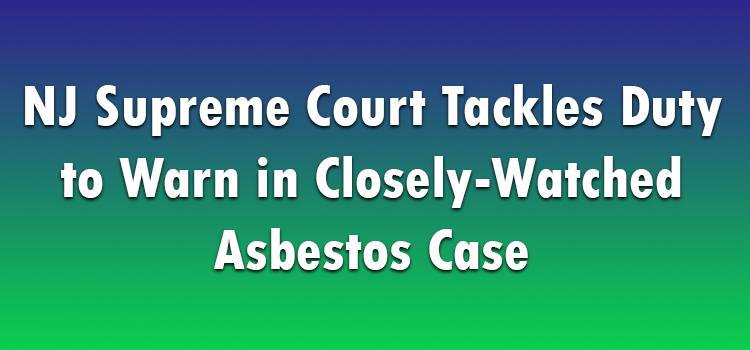
Facts of Whelan v. Armstrong International
Plaintiff Arthur Whelan contends that he developed mesothelioma as the result of his work-related exposure to numerous asbestos-containing products. He asserts, as a plumber and auto mechanic, he was exposed to asbestos in products manufactured by the defendants, specifically boilers, valves, steam traps, and brake drums. Although Whelan installed and worked with some original products manufactured by some defendants, he primarily encountered asbestos in his cleaning, repair, and replacement of components used in the products.
Defendants Armstrong International Inc., Burnham LLC, Carrier Corp., Cleaver-Brooks Inc., Crown Boiler Co., Ford Motor Co., Johnson Controls Inc., NIBCO Inc., and Oakfabco Inc. filed summary judgment motions. Each defendant argued that Whelan had not demonstrated exposure to friable asbestos on a regular and frequent basis from a product it sold, manufactured, supplied, or distributed. The trial judge found that the companies were not liable for asbestos-containing replacement parts they did not manufacture or place into the stream of commerce. Because Whelan could not identify an exposure to asbestos from a product actually manufactured or distributed by defendants, the court granted summary judgment to each defendant.
Appellate Division’s Decision in Whelan v. Armstrong International
The Appellate Division reversed. “We conclude that a duty to warn exists when the manufacturer’s product contains asbestos components, which are integral to the function of the product, and the manufacturer is aware that routine periodic maintenance of its product will require the replacement of those components with other asbestos-containing parts,” the court held.
As explained by the court, a manufacturer will have a duty to warn in strict liability if a plaintiff can show: 1) the manufacturer’s product as marketed to the end user contained asbestos-containing components; 2) the asbestos-containing components were integral to the function of the product; and 3) the manufacturer was reasonably aware its product would require periodic and routine maintenance involving the replacement of the asbestos-containing component parts with other asbestos-containing component parts.
In reaching its decision, the Appellate Division stated that it was “satisfied the imposition of such a duty does not offend basic principles of fairness and public policy that must be accorded to all parties.” It also noted that while there is no clear majority rule among other appellate state courts as to a manufacturer’s duty to warn for exposure to asbestos-containing replacement component parts required for the function of its product, the “recent trend, however, appears skewed towards the imposition of liability on manufacturers even where the worker’s exposure was to replacement parts, where the original product was manufactured with asbestos-containing parts.”
Issues Before Supreme Court in Whelan v. Armstrong International
The New Jersey Supreme Court agreed to consider the following question: “In a products liability case arising out of exposure to asbestos, does a manufacturer have a duty to warn about the risk of harm from exposure to asbestos-containing replacement parts integral to the function of the manufacturer’s product, where the manufacturer did not fabricate or distribute the replacement parts?”
The court heard oral arguments on November 19, 2019. In urging the justices to overturn the Appellate Division decision, the companies argued that its decision “contravenes decades of precedent.”
“The Appellate Division allowing plaintiffs to prove medical causation by exposure to third-party asbestos contravenes decades of precedent requiring exposure to asbestos the defendant actually made or sold, not asbestos that happened to be installed in or used with its products,” the companies’ attorney argued to the court.
Meanwhile, Whelan’s attorney argued that the Appellate Division’s decision was correct. “The policy reasons for imposing duty to warn here are significant,” he argued. “Defendants are in the best position as masters of their equipment to put [out] a warning.”
The Supreme Court of New Jersey has agreed to consider Fraternal Order of Police Newark Lodge No. 12 v. City of Newark. The case involves the legality of Newark’s civilian complaint review board, which was established to investigate allegations of police misconduct.
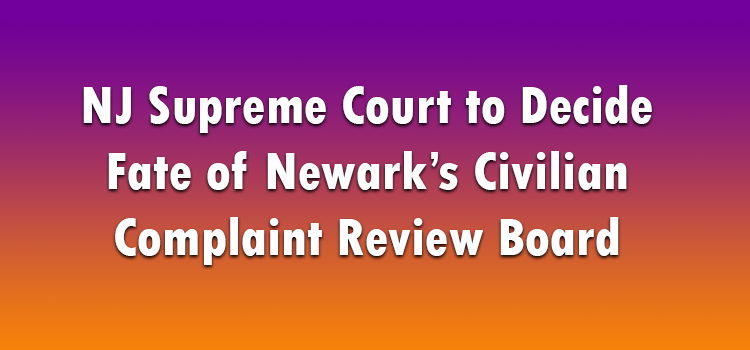
Facts of Fraternal Order of Police Newark Lodge No. 12 v. City of Newark
The City of Newark enacted an ordinance creating a civilian complaint review board (CCRB), in response to a “pattern or practice of constitutional violations” by the Newark Police Department (NPD). The violations were the subject of a U.S. Department of Justice investigation that found recurrent problems with the investigative affairs (IA) function of the NPD and resulted in a consent decree in a federal lawsuit.
As described by the Appellate Division, “The Ordinance is the embodiment of the City’s legislative policy decision to enable transparent investigation and examination into allegations of police misconduct.” Among other powers, the Ordinance authorizes the CCRB to conduct its own investigations of complaints filed by members of the public (including NPD members) against any member of the NPD. The CCRB can’t adjudicate complaints or impose discipline, but rather is tasked with investigating alleged police misconduct and making recommendations.
In August 2016, the Fraternal Order of Police Newark Lodge No. 12 (FOP), the exclusive collective negotiations representative for NPD officers, filed an order to show cause and a verified complaint. FOP alleged ultra vires creation of subpoena power by the Ordinance, in violation of N.J.S.A. 40:48-25 and the Faulkner Act, N.J.S.A. 40:69A-36. It contended that there existed an inconsistency between the Ordinance and the AG Guidelines and discipline of police officers by the IA division, in violation of the Law Enforcement Officers Protection Act, N.J.S.A. 40A:14-181. The FOP also alleged that the Ordinance deprived officers of due process and violated N.J.S.A. 40A:14-118, by infringing on the Chief’s rights.
The trial court invalidated the Ordinance with two exceptions: (1) the CCRB could perform an oversight function, and (2) the CCRB could consult with the Public Safety Director and NPD in the creation of the discipline matrix. The City of Newark appealed.
Appellate Division’s Decision
The Appellate Division held that the Ordinance is valid on its face with two exceptions. First, it found that the Ordinance infringes upon the Chief’s statutory rights by making the CCRB’s findings of fact binding, absent clear error. Second, it found that the Ordinance improperly permits disclosure of complainant and police officer identities. “Otherwise, we conclude that the CCRB can function as intended under the Ordinance, including providing an oversight role by investigating alleged police misconduct, conducting hearings, participating in the development of a disciplinary matrix, making recommendations, and issuing subpoenas,” the court wrote.
Issues Before the New Jersey Supreme Court
The New Jersey Supreme Court granted certification on October 21, 2019. It has agreed to consider the following question: “Does Newark’s ordinance creating a civilian complaint review board with the authority to issue subpoenas and investigate complaints of alleged police misconduct violate N.J.S.A. 40A:14-118, the Attorney General Guidelines on Internal Affairs Policy and Procedures under N.J.S.A. 40A:14-181, or police officers’ due process rights?”
Oral arguments have not yet been scheduled in the case. Please check back for updates.
The Supreme Court of New Jersey recently agreed to hear Christopher J. Gramiccioni v. Department of Law and Public Safety. The case involves whether the Attorney General’s Office was required to indemnify the Monmouth County Prosecutor’s Office over a wrongful death lawsuit brought by the estate of a woman killed by her ex-husband, a police officer.

Legal Background
Under N.J.S.A. 59:10-1, the New Jersey Attorney General owes defense and indemnity to state employees. County prosecutors occupy the “hybrid role” of serving both the State and county. When county prosecutors exercise their law enforcement authority, they are acting on behalf of and accountable to the State. Meanwhile, when county prosecutors “perform administrative tasks unrelated to their strictly prosecutorial functions, such as a decision whether to promote an investigator, the county prosecutor in effect acts on behalf of the county that is the situs of his or her office.” Lavezzi v. State, 219 N.J. 163, 171 (2014).
In State v. Wright, 169 N.J. 422 (2001), the New Jersey Supreme Court explained that the Attorney General must defend and indemnify county prosecutors “for the tortious actions” committed “in the performance of their law enforcement duties.” However, when county prosecutors are sued for actions performed while carrying out administrative tasks, they are not considered “agents” or “officers” of the State and no defense and indemnification is owed. Meanwhile, the Lavezzi Court explained the distinction between law enforcement and administrative actions:
The question is not whether the underlying liability has any nexus to law enforcement; a personnel or organizational decision is deemed administrative even if it affects the manner in which the prosecutor’s office administers its law enforcement responsibilities. Instead, the test is whether the act or omission of the county prosecutor’s office and its employees that gave rise to the potential liability derived from the prosecutor’s power to enforce the criminal law, and constituted an exercise of that power.
Facts of Gramiccioni v. Department of Law and Public Safety
On June 16, 2015, Philip Seidle, an off-duty Neptune Township police sergeant, shot and killed his ex-wife Tamara Wilson-Seidle with his service weapon. Wilson-Seidle’s estate (Estate) brought a lawsuit in the United States District Court for the District of New Jersey, Kirsten Seidle, et al. v. Neptune Township, et al., No. 17-4428 (D.N.J. June 16, 2017), against the Monmouth County Prosecutor’s Office (MCPO), Monmouth County Prosecutor Christopher J. Gramiccioni, and former Monmouth County Assistant Prosecutors Gregory J. Schweers, Jacquelynn F. Seely, and Richard E. Incremona, among other law enforcement agencies. The suit alleged that alleged the defendants failed to properly protect Wilson-Seidle, permitted Seidle to remain on the police force, improperly returned Seidle’s service weapons after they were civilly seized, failed to follow the Attorney General’s guidelines for handling domestic violence complaints, and failed to conduct an administrative investigation.
The MCPO and Gramiccioni subsequently sought defense and indemnification from the New Jersey Attorney General. Relying on Wright, the Attorney General distinguished claims arising from “classic” law enforcement activities, which the Attorney General must defend and indemnify, from administrative functions, which are carried out on behalf of the county and are not eligible for defense and indemnification. Accordingly, the Attorney General declined to provide indemnification for claims related to allowing Seidle to remain employed, permitting him to have a service weapon, and reinstating him after a suspension. However, it agreed to indemnify the defendants for claims related to ailing to monitor evidence of stalking by Seidle, failing to conduct a proper internal affairs investigation, failing to respond properly to the scene of the fatal shooting, and failing to file or assist Wilson-Seidle with filing a restraining order against Seidle.
The MCPO and Gramiccioni appealed, arguing that the return of the service weapon and allowing Seidle to remain employed were law enforcement functions. Thereafter, the estate of Wilson-Seidle filed several amended complaints, adding new parties and restating certain claims. In the third amended complaint, the estate stated that “at all relevant times [appellants] were acting in an administrative capacity as opposed to a law enforcement or investigatory function.” Citing this language, the Attorney General issued a blanket denial of defense and indemnification for all claims in the third amended complaint.
Appellate Division’s Decision
The Appellate Division concluded the Attorney General properly applied Wright and correctly determined which claims in the original complaint pertained to appellants’ law enforcement or administrative functions. However, it found that the Attorney General failed to apply the same scrutiny to the subsequent amended complaints.
“We reverse the Attorney General’s denial of defense and indemnification as to the first amended, second amended and third amended complaints to the extent that certain allegations, previously determined by the Attorney General to relate to the exercise of law enforcement functions, and thus covered under Wright, were re-pled notwithstanding their purported dismissal with prejudice,” the panel wrote.
Issues Before the NJ Supreme Court
The New Jersey Supreme Court granted certification on November 4, 2019. The court has agreed to consider the following question: “Under the circumstances presented, was the Attorney General required to defend and indemnify the Monmouth County Prosecutor’s Office, the Monmouth County Prosecutor, and Assistant Prosecutors named as defendants in a civil complaint, pursuant to Wright v. State, 169 N.J. 422 (2001)?”
Oral arguments have not yet been scheduled in the case.
In the Matter of Registrant, G.H. and G.A., (A-38-18/081737)(Decided October 29, 2019), the Supreme Court of New Jersey held that a provision of Megan’s Law that requires some sex offenders to register for life does not apply retroactively.
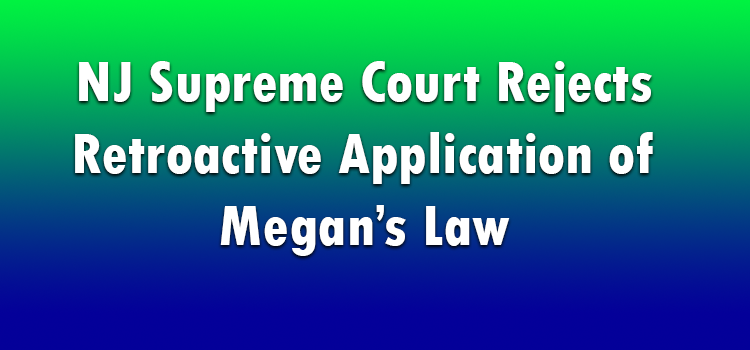
Facts of Matter of Registrant, G.H. and G.A.
Registrants G.H. and G.A. both pleaded guilty to offenses that required them to register for life under Megan’s Law. At the time of their pleas, they would have been eligible to apply for relief from lifetime registration years later, under subsection (f) of N.J.S.A. 2C:7-2, if they did not commit an offense within fifteen years of their convictions or their release from jail, and if a judge found they were “not likely to pose a threat to the safety of others.”
In 2002, the New Jersey Legislature amended Megan’s Law to add a provision, Subsection (g), that bars certain convicted sex offenders, including those who are convicted of more than one sex offense, or who have been convicted of certain violent sex offenses, from applying to terminate their registration requirements. As a result, the lifetime registration requirements of Megan’s Law became “permanent[ and] irrevocable” for offenders like G.H. and G.A.
Neither G.H. nor G.A. has committed an offense for more than fifteen years since his release from custody. Prior to the adoption of subsection (g), both would have been eligible for relief from lifetime registration pursuant to N.J.S.A. 2C:7-2(f) However, because G.H. was convicted of more than one sexual offense, and both G.H. and G.A. were convicted of offenses listed in subsection (g), the respective trial courts denied their requests to terminate registration obligations.
The Appellate Division reversed, holding that the New Jersey Legislature did not intend for Subsection (g) to apply retroactively. In reaching its decision, the Appellate Division observed that “the Legislature did not explicitly provide that subsection (g) applied retroactively” and found no implied intent of retroactive application in the legislative history of Megan’s Law or subsection (g). The court added that “[a] statute also may be applied retroactively if it is ‘curative’ . . . or if the parties’ expectations warrant retroactive application” but found those “categories of potential retroactive application” inapplicable in this case. The appeals court further held that applying the provision to those who were “convicted or released” prior to January 8, 2002 would be “manifestly unjust.”
NJ Supreme Court’s Decision in Matter of Registrant, G.H. and G.A.
The New Jersey Supreme Court affirmed in a per curium decision. “[T]he Court finds no statement of legislative intent, express or implied, that subsection (g) should be applied retroactively,” the court held. “Nor does it find that subsection (g) was curative, or that the parties’ expectations warranted retroactive application.”
The New Jersey Supreme Court recently heard oral arguments in a case concerning what type of evidence is admissible to show that a defendant was under the influence of narcotics while driving, specifically the admissibility of drug recognition expert (DRE) testimony. The court’s decision in State v. Michael Olenowski is likely to become increasingly relevant as the state seeks to legalize recreational marijuana use.
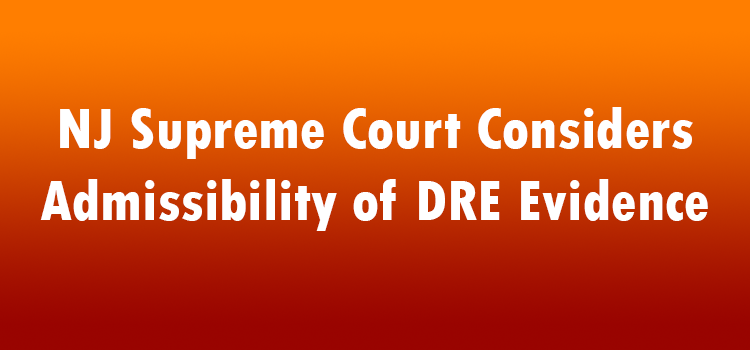
Facts of State v. Michael Olenowski
Defendant Michael Olenowski appeals his conviction for driving while intoxicated (DWI), N.J.S.A. 39:4-50(a), on two separate occasions in 2015. On both occasions, officers administered blood-alcohol content (BAC) tests, which revealed levels below the legal limit. Olenowski had a .04 percent BAC on the first occasion and a zero percent reading the second. Nonetheless, both the arresting officers and the DREs that evaluated him concluded that he was visibly impaired.
DREs are police officers who are specially trained to conduct a Drug Influence Evaluation (DIE). The evaluation is intended to identify the physical signs of drug intoxication by using a series of assessments, including standard field sobriety tests.
Olenowski challenged the admissibility of the DRE testimony, arguing that it is not reliable or generally accepted in the scientific community. When dealing with scientific evidence, New Jersey has adopted the Frye standard of admissibility as set forth in State v. Harvey, 151 N.J. 117, 169-70 (1997). Under the standard, the proponent of a newly-devised scientific technology can prove its general acceptance in three ways:
(1) by expert testimony as to the general acceptance, among those in the profession, of the premises on which the proffered expert witness based his or her analysis;
(2) by authoritative scientific and legal writings indicating that the scientific community accepts the premises underlying the proffered testimony; and
(3) by judicial opinions that indicate the expert’s premises have gained general acceptance.
The trial court ruled that DRE evidence was “generally acceptable and reliable in the scientific community.” The Appellate Division affirmed the decision. It found that that there was “sufficient credible evidence in the record” to support the Law Division’s findings that Olenowski was driving while intoxicated on both occasions.
Issues Before New Jersey Supreme Court
The New Jersey Supreme Court has agreed to decide the following question: “Is Drug Recognition Experts (DRE) evidence – which, in this case, included testimony that defendant was under the influence of narcotics while driving – admissible under the standard articulated in Frye v. United States, 293 F. 1013 (D.C. Cir. 1923)?”
During oral arguments, New Jersey Deputy Attorney General Sarah C. Hunt argued that the DRE methodology has already been reviewed by numerous courts and deemed reliable. “We’ve reached critical mass,” Hunt argued. “There’s simply no need to replay the same hearings over and over in every state, when this issue has been decided using the same protocol, using the same tests, and likely many of the same experts in so many of our sister states.”
Meanwhile, ACLU attorney Alex Shalom maintained that the protocol should be scrutinized under Frye because it has its basis in science. “‘Scientific’ doesn’t mean the person needs to wear a white lab coat. It’s not who is making the decisions,” he said. “‘Scientific’ means does it rely on the scientific method: observation, hypothesis, testing, iteration? That’s exactly what the DRE protocol does.”
The Supreme Court of New Jersey recently agreed to consider the extent of social host liability under New Jersey law. The case, Estate of Narleski v. Gomes, specifically involves whether there is a legal duty of the owners or occupants of a home to prevent underage individuals from consuming alcohol there.
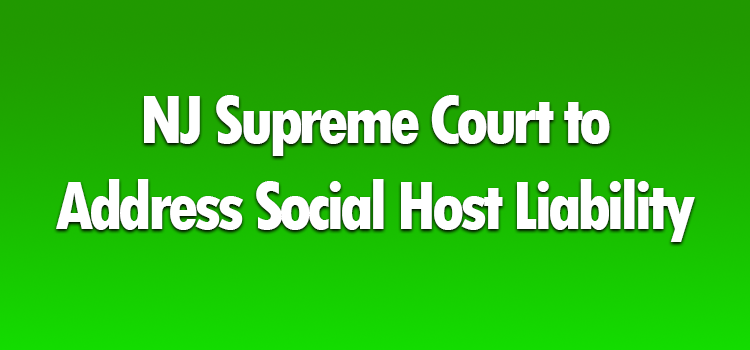
Facts of Estate of Narleski v. Gomes
As the Appellate Division explained, the tragic facts of the case were set in motion when decedent Brandon Narleski purchased a “handle” of vodka, three twenty-four ounce cans of beer, and a two-liter bottle of soda from a liquor store owned and operated by defendant Amboy Food Liquor and News, Inc. (Amboy). Three young men – Xavier Pinto, Zachary Johnson, and Mark Zwierzynski – accompanied Narleski to the liquor store. The store clerk did not check Narleski’s identification to verify that he was of legal age. The men were all adults over the age of eighteen but were under the legal drinking age of twenty-one.
Once Narleski purchased the alcohol, the young men drove to Mark’s house, where he lived with his mother, Mercedes Apraez. While at the residence, the four friends “hung out” in Mark’s bedroom, drank the purchased alcohol, and played games. Mark’s mother was not home when they arrived. At some point during the gathering, Narleski sent a text message to Nicholas Gomes, who also was an adult under the age of twenty-one, to come to Mark’s house to join the group in drinking.
At some point, Gomes and Narleski left the house, intending to go to a friend’s house about fifteen minutes away. Gomes got into the driver’s seat and fastened his seatbelt. Narleski got into the passenger’s seat, but did not fasten his own seatbelt. While Gomes was driving on a highway, he lost control of the car and crashed into the center median. As a result of the crash, Narleski was ejected from the vehicle and pronounced dead on the scene.
The Estate of Brandon Narleski and his parents subsequently filed a wrongful death suit against Gomes and Anboy. Amboy filed a third-party complaint against Mark Zwierzynski and his parents, seeking contribution and indemnity. The third-party complaint alleged that Mark and his parents were negligent in failing to supervise Narleski and Gomes, enabling those underage adults to consume alcohol in their home.
The trial court concluded that the third-party defendants did not have a legal duty to supervise the underage persons who had been drinking alcohol in their home because those persons were adults. Thereafter, plaintiffs settled their claims with the direct defendants, i.e., Amboy and Gomes. However, Amboy appealed the dismissal of the third-party claims.
Appellate Division’s Decision in Estate of Narleski v. Gomes
The Appellate Division affirmed summary judgment. It agreed that Mark’s parents didn’t have a statutory or common law duty to prevent their adult son from allowing his underage friends to consume alcohol in his room without the parents’ knowledge or consent. However, it held that individuals like Mark could be held liable, although it declined to impose liability in this case.
“Prospectively, however, we hold that an adult such as Mark Zwierzynski who is under the legal drinking age shall owe a common law duty to injured parties to desist from facilitating the drinking of alcohol by underage adults in his place of residence, regardless of whether he owns, rents, or manages the premises,” Judge Jack Sabatino wrote. “Such a rule of law is a logical extension of Thomas and Morella, and is consistent with the policy objectives of related statutes,” he added.
“We need not resolve here whether a claim for contribution or indemnity by a Dram Shop defendant against an underage social host seeking to diminish its liability would be viable or instead contrary to public policy. We recognize that the common law rule of liability we have endorsed goes beyond the scope of the disorderly persons statute, N.J.S.A. 2C:33-17,” Sabatino further explained. “For these reasons, the trial court’s summary judgment dismissal of Amboy’s third-party complaint is affirmed.”
The Appellate Division deferred the effective date of its decision for 180 days “to enable possible further judicial review or responsive legislation.”
Issues Before the NJ Supreme Court
The New Jersey Supreme Court granted a petition for certification on October 10, 2019. It has agreed to consider the following question: “Does an adult who is under the legal drinking age owe injured parties a duty under the common law to desist from facilitating drinking by underage adults in his or her place of residence?” Oral arguments have not yet been scheduled.
U.S. District Judge Brian Martinotti recently issued a preliminary injunction in Americans for Prosperity v. Grewal. The order halts the implementation of Senate Bill No. 150, which is often referred to as New Jersey’s dark money law. In support of his decision, Judge Martinotti cited “the likely unconstitutional reach of the Act.”

Facts of Americans for Prosperity v. Grewal
The New Jersey Senate passed Senate Bill 1500 on March 25, 2019. According to a statement by the Senate Budget and Appropriations Committee, this legislation was intended to update “‘The New Jersey Campaign Contributions and Expenditures Reporting Act’ to institute new reporting requirements on certain organizations, and increase the limits on the amount of money that may be contributed by individuals, candidates, and committees to other candidates and committees.” It specifically addresses “independent expenditure committees,” which are defined as any person or entity “organized under section 527 of the federal Internal Revenue Code (26 U.S.C. § 527) or under paragraph (4) of subsection c. of section 501 of the federal Internal Revenue Code (26 U.S.C. § 501) that does not fall within the definition of any other organization.”
Pursuant to N.J. Stat. Ann. § 19:44A-8(d)(1) as amended by S1500, these independent groups must file quarterly with ELEC a list of all contributions of more than $10,000 and, pursuant to N.J. Stat. Ann. § 19:44A-8(d)(2), all expenditures of more than $3,000 spent on “influencing or attempting to influence the outcome” of any election, public question, legislation or regulation, or “provide any political information” on any candidate, public question, legislation or regulation. The non-exhaustive list of expenditures that count toward the $3,000 include “electioneering communications, voter registration, get-out-the-vote efforts, polling, and research.
New Jersey Governor Phillip Murphy conditionally vetoed the bill on May 13, 2019, stating that while he commended the Legislature’s attempt to “ensure that so-called ‘dark money’ is brought out into the open,” he believed certain provisions “may infringe” rights of free speech and free association protected by the First Amendment of the U.S. Constitution. In response, the Senate passed a bill practically identical to S1500 that was renumbered as S150. Gov. Murphy signed S150 into law on June 17, 2019, though he issued a signing statement reiterating the same concerns identified in his conditional veto of the prior bill.
Plaintiff Americans for Prosperity (Plaintiff or AFP) filed suit on June 25, 2019, seeking a “declaration that S150’s provisions compelling disclosure of donor information and compliance with its burdensome reporting requirements violates the First Amendment (as incorporated by the Fourteenth Amendment) both on their face and as applied to AFP, and are therefore null and void.” It also sought an injunction enjoining enforcement of the new law.
In response to the suit, the State of New Jersey argued that S150 is constitutionally sound on its face and as applied to Plaintiff. It further maintained that each of Plaintiff’s arguments rely on an overbroad reading of the statute, and that its “election-related disclosure requirements” are similar to those “courts have upheld over the course of decades.
Court’s Decision in Americans for Prosperity v. Grewal
Judge Martinotti granted the preliminary injunction, concluding that AFP was likely to show that S150 fails to pass constitutional scrutiny.
In reaching his decision, Judge Martinotti concluded the plain text does not reveal “a substantial relation between the disclosure requirement and a sufficiently important governmental interest.” Accordingly, he found that S150 is constitutionally overbroad, noting that “the Court sees few, if any, limitations in the Act.”
Judge Martinotti rejected the State’s argument that a narrow reading could save the Act, concluding that it still went beyond what is permissible under First Amendment precedent. As he explained:
Even if the Court were inclined to read “electioneering communications” as limiting or synonymous with “influencing or attempting to influence” as Defendants suggest, the Court’s conclusion would be unchanged. That is because the Act requires the same disclosure scheme whether an independent expenditure committee engages in electioneering communications identifying a clearly defined candidate, engages in “influencing or attempting to influence” any election, or engages in providing political information, which the Act makes clear includes any fact or opinion. The interplay between the definitions of “electioneering communications” and “influencing or attempting to influence” advocated by Defendants may clear up confusion otherwise evident in the Act, but it is the definition of “providing political information” that the Court views as more constitutionally troubling, as it extends disclosure regimes the Supreme Court has approved of well beyond the boundaries set by Buckley, McConnell, and Citizens United.
Notably, Judge Martinotti’s decision does not strike down the law, but rather prohibits its enforcement during the pendency of the lawsuit. Nonetheless, the New Jersey Legislature is currently working on a narrower clean-up bill (Assembly Bill No. 5754) that is more likely to withstand legal challenges.
